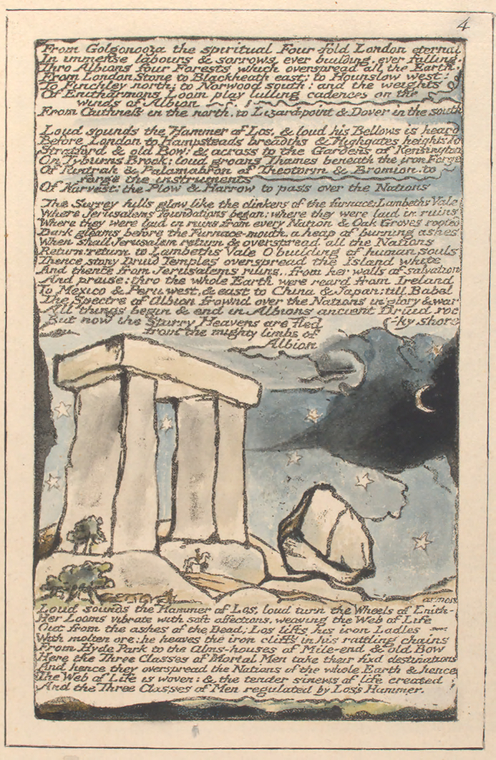 |
British Museum Descent into Death |
At the entrance of the cavern of many chambers stands an angel with a lighted candle for comfort and guidance. Behind her we see a stream of people on their way to the opening, including those entering the sleep of death and those who are already asleep. In the uppermost chamber is a man whose spirit is leaving his body as his beloved rejoices. On the stair below the angel is a woman carrying an infant to a chamber where it will sleep. To her right a group who await awakening at the completion of their journey lie peacefully in a tomb. In the center are two figures who are alone: a strong, young man rushing down the stair, and a bent old man seeking a place to rest. Traveling downward is a mother leading three children - one sobbing - to their appointed chamber. An old couple look into a room where a young couple - perhaps their younger selves - recline. In the lower left chamber lies a male body and three female figures - two mourning the death of the body and one rejoicing at the release of the spirit.
In Lilith by George MacDonald there is an echo of Blake's poetic understanding of awakening from the sleep of death. Before souls can fully awake MacDonald's characters go to the house of death where they sleep to be healed in order to awake to life. None goes to the house of death who wish to die, "for no one can die who does not long to live." As stated in the Prayer of St Francis "it is in dying that one is raised to eternal life."
Lilith, Page 217:
"There Lilith is the bed I have prepared for you!"
She glanced at her daughter lying before her like a statue carved in semi-transparent alabaster, and shuddered from head to foot. "How cold it is," she murmured.
"You will soon enough find comfort in the cold." answered Adam.
"Promises to the dying are easy!" she said.
"But I know it: I too have slept. I am dead!"
"I believed you dead long ago, but I see you alive!"
"More alive than you know, or are able to understand. I was scarce alive when you first knew me. I have slept, and am now awake; I am dead, and live indeed!"
Thel, Plate 1, (E 3)"O life of this our spring! why fades the lotus of the water?
Why fade these children of the spring? born but to smile & fall.
Ah! Thel is like a watry bow. and like a parting cloud.
Like a reflection in a glass. like shadows in the water.
Like dreams of infants. like a smile upon an infants face,
Like the doves voice, like transient day, like music in the air;
Ah! gentle may I lay me down, and gentle rest my head.
And gentle sleep the sleep of death. and gentle hear the voice
Of him that walketh in the garden in the evening time." Jerusalem, Plate 14, (E 158)"Enitharmon is a vegetated mortal Wife of Los:
His Emanation, yet his Wife till the sleep of death is past."Jerusalem, Plate 43 [29], (E 191)"Albion must Sleep
The Sleep of Death, till the Man of Sin & Repentance be reveald."Jerusalem, Plate 77, (E 233) "England! awake! awake! awake!
Jerusalem thy Sister calls!
Why wilt thou sleep the sleep of death?
And close her from thy ancient walls."Four Zoas, Night II, Page 23, (E 313)"Rising upon his Couch of Death Albion beheld his Sons
Turning his Eyes outward to Self. losing the Divine Vision
Albion calld Urizen & said. Behold these sickning Spheres
Whence is this Voice of Enion that soundeth in my Porches
Take thou possession! take this Scepter! go forth in my might
For I am weary, & must sleep in the dark sleep of Death
Thy brother Luvah hath smitten me but pity thou his youth
Tho thou hast not pitid my Age O Urizen Prince of Light"






